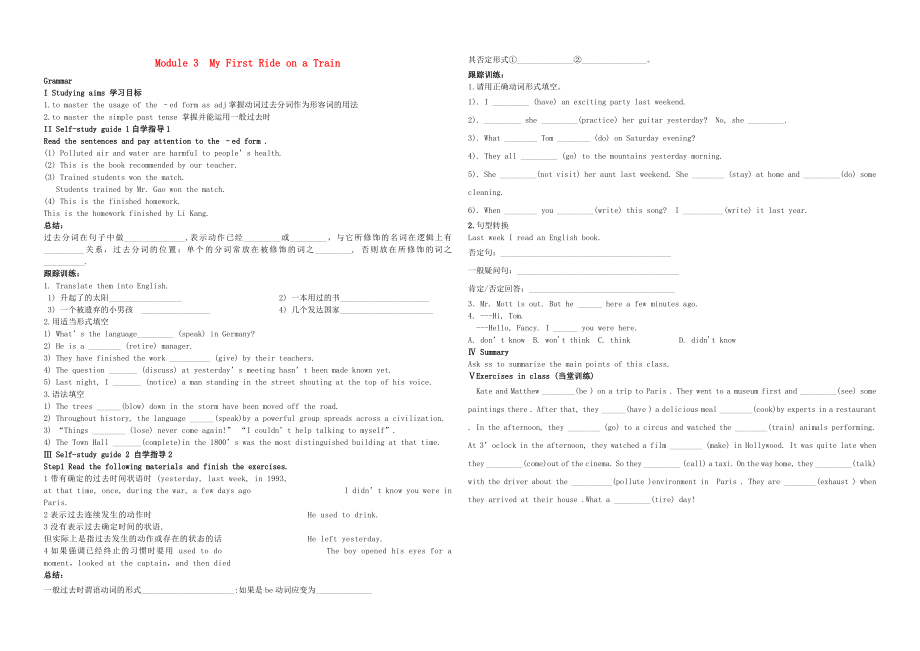《2015-2016學(xué)年高中英語(yǔ) Module3 My First Ride on a Trian語(yǔ)法導(dǎo)學(xué)案(無(wú)答案)外研版必修1》由會(huì)員分享�,可在線閱讀,更多相關(guān)《2015-2016學(xué)年高中英語(yǔ) Module3 My First Ride on a Trian語(yǔ)法導(dǎo)學(xué)案(無(wú)答案)外研版必修1(1頁(yè)珍藏版)》請(qǐng)?jiān)谘b配圖網(wǎng)上搜索���。
1�����、Module 3 My First Ride on a Train
Grammar
I Studying aims 學(xué)習(xí)目標(biāo)
1.to master the usage of the –ed form as adj掌握動(dòng)詞過(guò)去分詞作為形容詞的用法
2.to master the simple past tense 掌握并能運(yùn)用一般過(guò)去時(shí)
II Self-study guide 1自學(xué)指導(dǎo)1
Read the sentences and pay attention to the –ed form .
(1) Polluted air and water are harmful t
2����、o people’s health.
(2) This is the book recommended by our teacher.
(3) Trained students won the match.
Students trained by Mr. Gao won the match.
(4) This is the finished homework.
This is the homework finished by Li Kang.
總結(jié):
過(guò)去分詞在句子中做_______________,表示動(dòng)作已經(jīng)_________或_________,與它所修飾的名詞在邏輯
3�����、上有__________關(guān)系����,過(guò)去分詞的位置:?jiǎn)蝹€(gè)的分詞常放在被修飾的詞之_________, 否則放在所修飾的詞之__________.
跟蹤訓(xùn)練:
1. Translate them into English.
1) 升起了的太陽(yáng)__________________ 2) 一本用過(guò)的書(shū)______________________
3) 一個(gè)被遺棄的小男孩 _________________ 4) 幾個(gè)發(fā)達(dá)國(guó)家_______________________
2.用適當(dāng)形式填空
1) What’s the language_________
4、(speak) in Germany?
2) He is a ________ (retire) manager.
3) They have finished the work __________ (give) by their teachers.
4) The question _______ (discuss) at yesterday’s meeting hasn’t been made known yet.
5) Last night, I _______ (notice) a man standing in the street shouting at the top of
5���、 his voice.
3.語(yǔ)法填空
1) The trees ______(blow) down in the storm have been moved off the road.
2) Throughout history, the language ______(speak)by a powerful group spreads across a civilization.
3) “Things ________ (lose) never come again!” “I couldn’t help talking to myself”.
4) The Town Hall
6�、_______(complete)in the 1800’s was the most distinguished building at that time.
Ⅲ Self-study guide 2 自學(xué)指導(dǎo)2
Step1 Read the following materials and finish the exercises.
1帶有確定的過(guò)去時(shí)間狀語(yǔ)時(shí) (yesterday, last week, in 1993,
at that time, once, during the war, a few days ago I didn’t
7���、know you were in Paris.
2表示過(guò)去連續(xù)發(fā)生的動(dòng)作時(shí) He used to drink.
3沒(méi)有表示過(guò)去確定時(shí)間的狀語(yǔ),
但實(shí)際上是指過(guò)去發(fā)生的動(dòng)作或存在的狀態(tài)的話 He left yesterday.
4如果強(qiáng)調(diào)已經(jīng)終止的習(xí)慣時(shí)要用 used to do The boy opened his eyes for a moment,looked at the captain����,and then died
總結(jié):
一般過(guò)去時(shí)謂語(yǔ)動(dòng)詞的形式_____
8、__________________:如果是be動(dòng)詞應(yīng)變?yōu)開(kāi)_____________
其否定形式①______________②________________��。
跟蹤訓(xùn)練:
1.請(qǐng)用正確動(dòng)詞形式填空���。
1). I _________ (have) an exciting party last weekend.
2). _________ she _________(practice) her guitar yesterday? No, she _________.
3). What ________ Tom ________ (do) on Saturday eve
9�、ning?
4). They all _________ (go) to the mountains yesterday morning.
5). She _________(not visit) her aunt last weekend. She ________ (stay) at home and _________(do) some cleaning.
6). When ________ you _________(write) this song? I __________(write) it last year.
2.句型轉(zhuǎn)換
Last week I re
10、ad an English book.
否定句:__________________________________________
一般疑問(wèn)句:________________________________________
肯定/否定回答:____________________________________
3.Mr. Mott is out. But he ______ here a few minutes ago.
4. ---Hi, Tom.
---Hello, Fancy. I ______ you were here.
A. don’t know
11�����、 B. won't think C. think D. didn't know
Ⅳ Summary
Ask ss to summarize the main points of this class.
ⅤExercises in class (當(dāng)堂訓(xùn)練)
Kate and Matthew ________(be ) on a trip to Paris . They went to a museum first and _________(see) some paintings there . After that, they ______(have ) a delic
12�����、ious meal ________(cook)by experts in a restaurant . In the afternoon, they ________ (go) to a circus and watched the ________(train) animals performing. At 3’oclock in the afternoon, they watched a film ________ (make) in Hollywood. It was quite late when they _________(come)out of the cinema. So they _________ (call) a taxi. On the way home, they _________(talk) with the driver about the __________(pollute )environment in Paris . They are ________(exhaust ) when they arrived at their house .What a _________(tire) day!
 2015-2016學(xué)年高中英語(yǔ) Module3 My First Ride on a Trian語(yǔ)法導(dǎo)學(xué)案(無(wú)答案)外研版必修1
2015-2016學(xué)年高中英語(yǔ) Module3 My First Ride on a Trian語(yǔ)法導(dǎo)學(xué)案(無(wú)答案)外研版必修1
